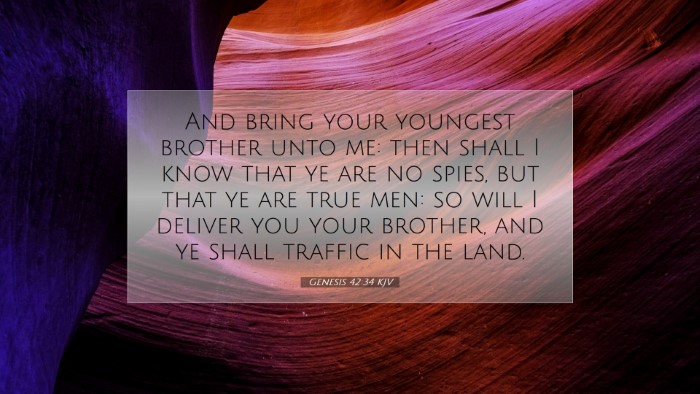Commentary on Genesis 42:34
The verse Genesis 42:34 states, “And bring your youngest brother unto me: then shall I know that you are honest men; I will prove your words: but if you will not bring him, you shall see my face no more.” This verse is a pivotal moment in the narrative of Joseph and his brothers, packed with theological and moral insights.
Contextual Background
This incident occurs during a famine that affects Canaan, prompting Jacob's sons to go to Egypt in search of grain. Joseph, now a powerful ruler in Egypt, recognizes his brothers but conceals his identity. The request for Benjamin, the youngest brother, serves multiple purposes, both practical and symbolic.
The Request for Benjamin
Joseph's insistence on seeing Benjamin represents a crucial test for the brothers. Henry notes that “Joseph’s testing of his brothers is a means to bring about their repentance and restoration.” It reveals their character and whether they have changed since selling him into slavery. This emphasizes the theme of brotherhood and familial responsibility in the narrative.
Moreover, this demand demonstrates Joseph's deep-seated desire for reconciliation with his family, particularly with Benjamin, his only full brother. Clarke explains that Joseph was strategically ensuring the safety of his beloved younger brother while also assessing the integrity of the brothers who had wronged him.
The Concept of Honesty
Joseph states that he will know if they are “honest men” only if they bring their youngest brother. Barnes elaborates on the condition of honesty, suggesting that true integrity must manifest in relationships, especially among family. It raises the question of whether they can be trusted after their previous betrayals.
- Trust Restoration: The journey towards trust and forgiveness is a key theme. The brothers had to confront their past actions and the potential consequences thereof.
- Character Development: The demand to bring Benjamin back serves as a mechanism for change within the brothers, shifting from greed and betrayal towards accountability.
The Theological Implications
This verse touches upon divine sovereignty and human agency. Joseph’s actions underscore God’s providential work through human decisions. Clarke states, “Joseph’s current position is not merely his own making but a part of a larger divine narrative.” It invites readers to consider how God works through our failures and trials.
Furthermore, the test of Joseph seems to evoke a deeper existential question: how we are defined by our past actions and how we can seek redemption. This encounter with his brothers creates an opportunity for healing and restoration.
Reflection on Repentance and Forgiveness
The narrative therein reflects crucial Christian themes of repentance and forgiveness. As those who reflect on scripture, it urges us to examine our lives in relation to others and the potential for restoration. Henry suggests that “the path towards reconciliation often requires confronting one’s misdeeds and seeking to amend them.”
Concluding Thoughts
Genesis 42:34 encapsulates a pivotal moment influencing the larger Joseph narrative. It is a story of testing, reflection, and the potential inevitability of reconciliation, rich in theological depth.
As we study this verse, we are encouraged to contemplate our own lives in light of honesty, integrity, and the transformative power of God's grace in our relationships with others. Furthermore, it inspires pastoral reflection on how to guide congregants in their own journeys towards forgiveness and restoration across familial and communal lines.


